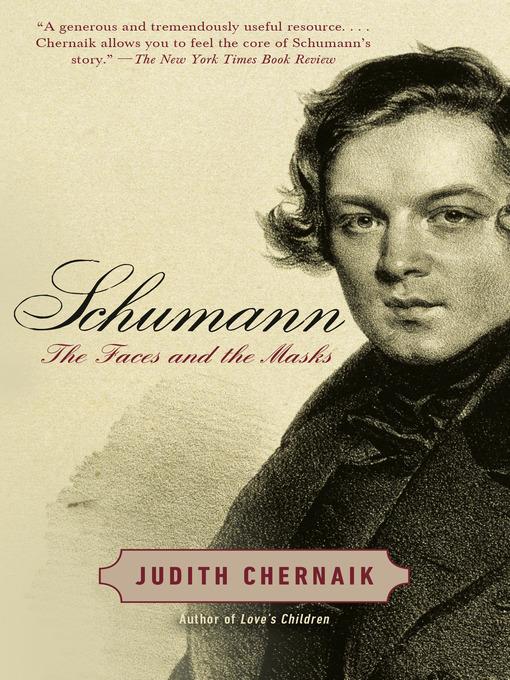
Schumann
The Faces and the Masks
- اطلاعات
- نقد و بررسی
- دیدگاه کاربران
نقد و بررسی

Starred review from August 1, 2018
A guided tour through the life and work of Robert Schumann (1810-1956), a musical genius who viewed the sublime before a decline into a syphilitic madness.Chernaik (Mab's Daughters, 1991, etc.), who has taught at Columbia, Tufts, and elsewhere, has clearly devoted years of research to this lush life. Although she asserts in the introduction that she is aiming her work at "the general reader," there are many places--especially in her analyses of individual works--where general readers will require some fairly sophisticated understandings of music. That caveat aside, Chernaik rewards those who do journey through these pages with insights and conclusions that make the reading experience both enjoyable and educative. She teaches us a lot about Schumann's world and life, including details about his boyhood and his early love for Clara Wieck (the gifted pianist whom he would later marry), whose father's angry opposition to their relationship courses throughout the early sections. (They had to go to court to obtain legal permission to marry.) Throughout, the author shows us a complicated composer. Fond of drink and of women, he had difficulty settling down; in later sections, we see his inability to conduct less-than-gifted musicians during a stint in Düsseldorf. Chernaik also chronicles his friendships with numerous other musical luminaries and legends, including Chopin, Mendelssohn, and Brahms. Brahms also developed a crush on the older Clara Schumann, but nothing ensued. The author escorts us through Schumann's most noteworthy works, and we see his frustration about not being able to compose a successful opera. She lets us know which works are still performed, and in agonizing detail, she rehearses Schumann's descent into darkness in a chapter aptly titled, "The Mind Stripped Bare."A sturdy foundation of research and musical knowledge (and love) underlies this inspiring and wrenching account of a man who pursued, captured, and lost.
COPYRIGHT(2018) Kirkus Reviews, ALL RIGHTS RESERVED.

Starred review from October 1, 2018
Chernaik (The Lyrics of Shelley) vividly brings to life German composer Robert Schumann (1810–1856). Using Schumann’s personal diaries, letters, and other key archival sources, Chernaik puts Schumann’s life in a new light while providing an overview of Romanticism in 19th-century Europe, which included composers , Frédéric Chopin and Felix Mendelssohn. During this time, Schumann created narratives around fictional characters, such as Johannes Kreisler (taken from the works of poet E.T.A. Hoffmann) in his composition Kreisleriana. Chernaik skillfully puts Schumann’s compositions in the context of the events in his life when he was writing them—the death of his sister Fanny in 1847, for example, cast him into depression and inspired him to compose his F-sharp minor string quartet. Chernaik details Schumann’s romance with pianist Clara Wieck, who would become his wife, as well as Schumann’s mental illness, suicide attempt, and death. Using the previously unavailable full medical diary of Endenich Asylum in Germany, Chernaik suggests that Schumann suffered from late-stage syphilis, which caused paralysis and psychosis, and ultimately killed him. Fast-paced and informative, this biography wonderfully explores the life of a great and troubled composer.

Starred review from September 1, 2018
Following Beethoven's lead, most of the greatest Romantic composers became, of necessity, entrepreneurs and legends in their own time. None of their stories is sadder than Robert Schumann's, involving as it does a haunted conscience; a tremendous struggle for personal happiness; a steady flow of musical creativity; and then, long-drawn-out mental and physical collapse. His story is oft-told, but Chernaik's version eclipses its predecessors in two, perhaps three, respects. She has accessed newly released documentation of Schumann's final illness that confirms it was tertiary syphilis (immediate cause of death was pneumonia); primary neuropathology can now be dismissed. She fills the book with descriptions of Schumann's compositions that are more easily followed and more thorough than most recording liner notes and that convincingly relate each piece to Schumann's life circumstances as well as to his other music?all without excerpting musical scores. The third distinction stems from the fact that Chernaik is also a novelist. She doesn't get bogged down in data or scholarly one-upmanship, her vocabulary is direct and strong, and she keeps the line of Schumann's life ever before us; her Schumann biography is not a life-and-times (for a monument of that approach, see Alan Walker's Fryderyk Chopin, 2018) but rather a life-and-works. Altogether outstanding.(Reprinted with permission of Booklist, copyright 2018, American Library Association.)

August 1, 2018
In this intimate biography of the great Romantic composer Robert Schumann (1810-56), Chernaik (The Lyrics of Shelley), who betrays a close acquaintance with the composer's oeuvre, offers a very personal take on his life, drawing on unpublished archival material as well as Schumann's diary entries to round out her portrait. She uses the conceit of "faces and masks"--"different ways of presenting himself"--to describe the various aspects of Schumann's "multilayered" personality, while documenting the gradual deterioration of his mind, which led to his confinement in a mental facility near the end of his life. Relating the musician's compositions to events in his life, above all his enduring love of wife Clara, herself a noted composer and brilliant pianist, Chernaik further details Schumann's major influences (Bach, Mozart, Beethoven, Schubert) and close friendships with other composers--Mendelssohn, Chopin, Liszt, and especially Brahms. While providing ample discussion of the classical works, Chernaik eschews technical language and musical notation. VERDICT Highly recommended for informed readers who'd like to know more about classical music and, of course, Chernaik's beloved subject. [See Prepub Alert, 4/9/18.]--Edward B. Cone, New York
Copyright 2018 Library Journal, LLC Used with permission.

August 1, 2018
A regular contributor to the English journal Musical Times, Chernaik takes a new look at the Romantic composer.
Copyright 2018 Library Journal, LLC Used with permission.




دیدگاه کاربران